National Culture: Hofstede's vs. McSweeney's Perspectives Report
VerifiedAdded on 2020/04/07
|6
|731
|353
Report
AI Summary
This report provides an executive summary, introduction, analysis, and conclusion regarding the debate between Geert Hofstede and Professor Brendan McSweeney's views on national culture. Hofstede's work, which identifies dimensions of national cultures, is contrasted with McSweeney's counter-argument, which emphasizes the existence of sub-cultures within nations. The analysis examines the practical implications of both perspectives, exploring the study's scope and its relevance to organizational success. The report references key sources and offers insights into the ongoing discussion about cultural homogeneity and its impact on individual behavior within a global context. The conclusion suggests McSweeney's views are more practical and applicable for organizations and researchers. The report is a valuable resource for understanding cross-cultural studies and leadership management.
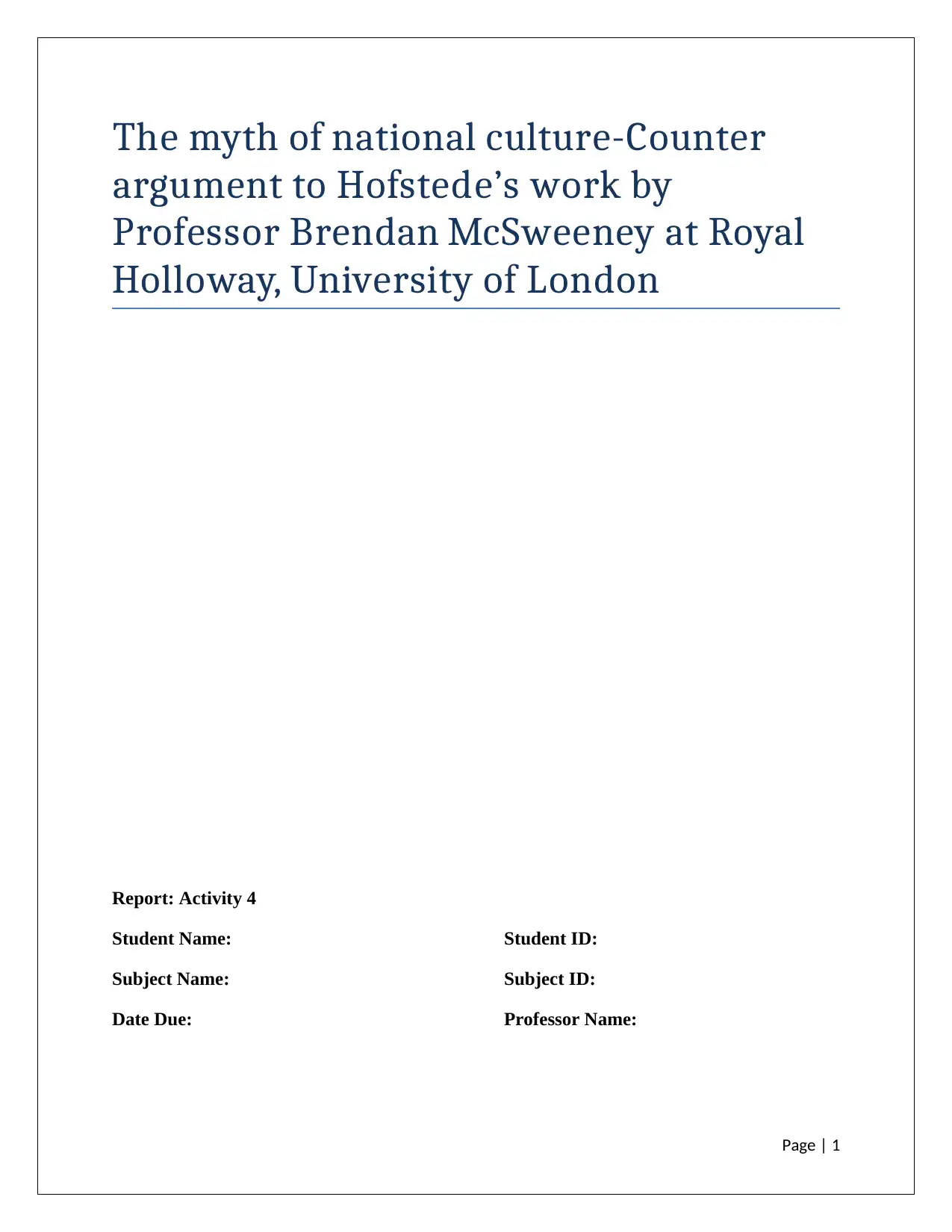
The myth of national culture-Counter
argument to Hofstede’s work by
Professor Brendan McSweeney at Royal
Holloway, University of London
Report: Activity 4
Student Name: Student ID:
Subject Name: Subject ID:
Date Due: Professor Name:
Page | 1
argument to Hofstede’s work by
Professor Brendan McSweeney at Royal
Holloway, University of London
Report: Activity 4
Student Name: Student ID:
Subject Name: Subject ID:
Date Due: Professor Name:
Page | 1
Paraphrase This Document
Need a fresh take? Get an instant paraphrase of this document with our AI Paraphraser
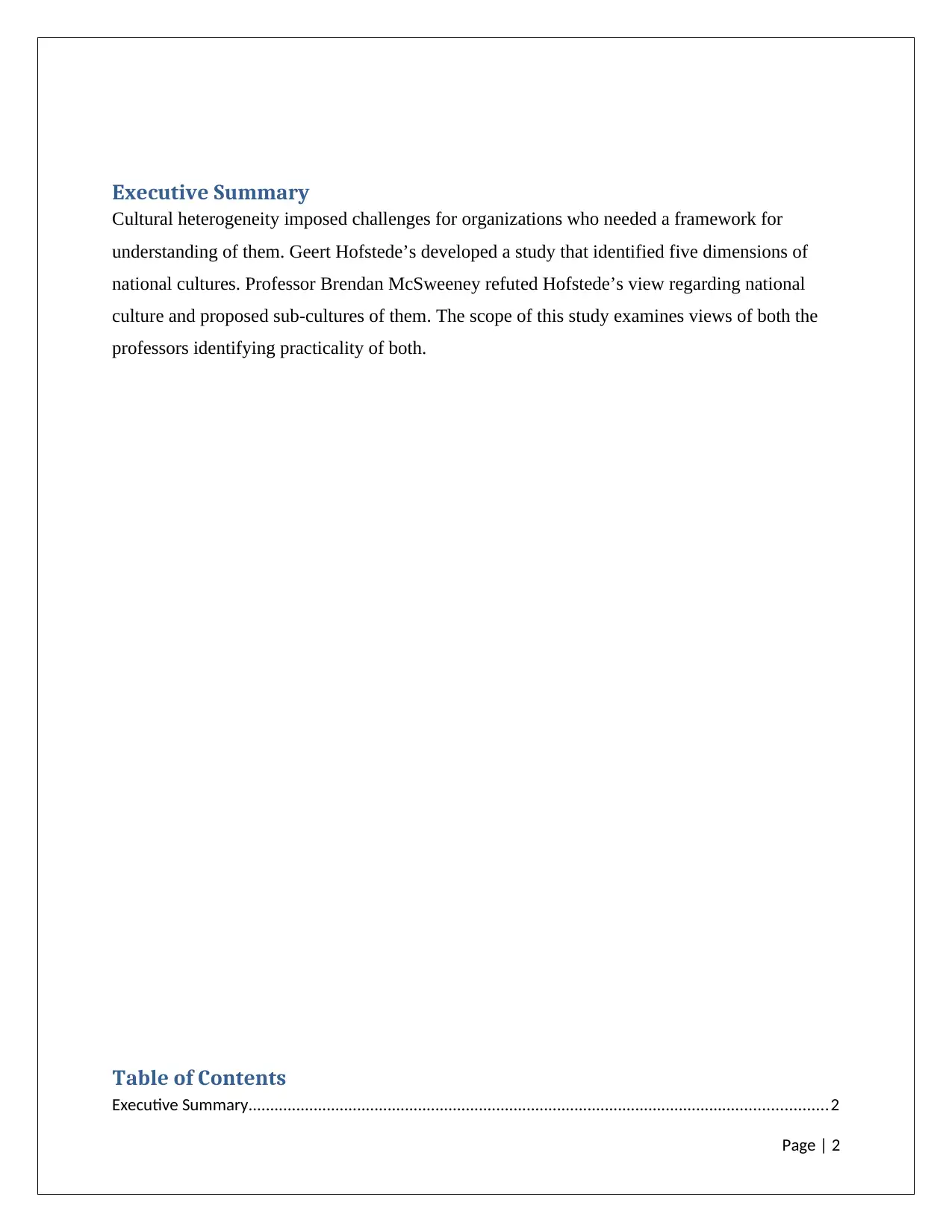
Executive Summary
Cultural heterogeneity imposed challenges for organizations who needed a framework for
understanding of them. Geert Hofstede’s developed a study that identified five dimensions of
national cultures. Professor Brendan McSweeney refuted Hofstede’s view regarding national
culture and proposed sub-cultures of them. The scope of this study examines views of both the
professors identifying practicality of both.
Table of Contents
Executive Summary.....................................................................................................................................2
Page | 2
Cultural heterogeneity imposed challenges for organizations who needed a framework for
understanding of them. Geert Hofstede’s developed a study that identified five dimensions of
national cultures. Professor Brendan McSweeney refuted Hofstede’s view regarding national
culture and proposed sub-cultures of them. The scope of this study examines views of both the
professors identifying practicality of both.
Table of Contents
Executive Summary.....................................................................................................................................2
Page | 2
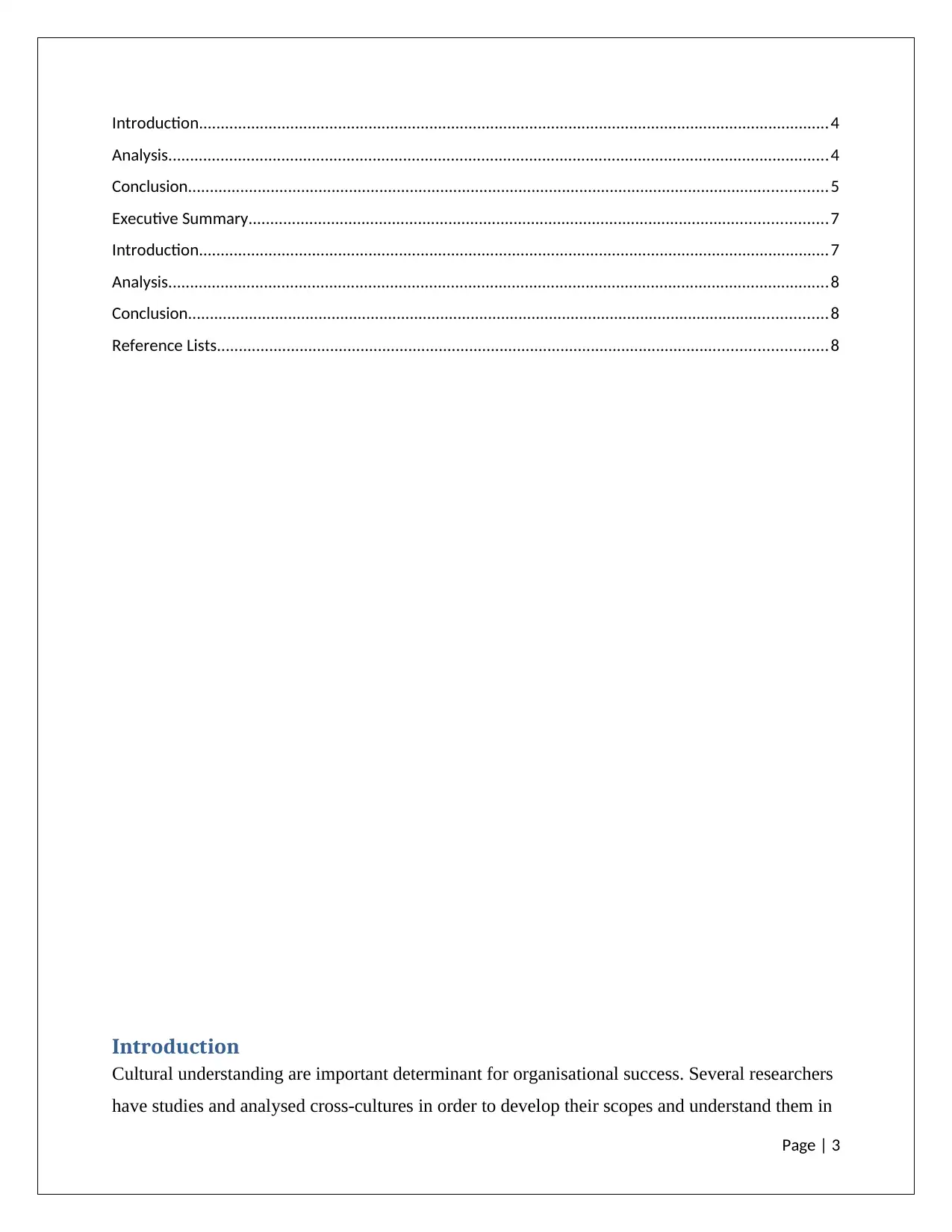
Introduction.................................................................................................................................................4
Analysis........................................................................................................................................................4
Conclusion...................................................................................................................................................5
Executive Summary.....................................................................................................................................7
Introduction.................................................................................................................................................7
Analysis........................................................................................................................................................8
Conclusion...................................................................................................................................................8
Reference Lists............................................................................................................................................8
Introduction
Cultural understanding are important determinant for organisational success. Several researchers
have studies and analysed cross-cultures in order to develop their scopes and understand them in
Page | 3
Analysis........................................................................................................................................................4
Conclusion...................................................................................................................................................5
Executive Summary.....................................................................................................................................7
Introduction.................................................................................................................................................7
Analysis........................................................................................................................................................8
Conclusion...................................................................................................................................................8
Reference Lists............................................................................................................................................8
Introduction
Cultural understanding are important determinant for organisational success. Several researchers
have studies and analysed cross-cultures in order to develop their scopes and understand them in
Page | 3
⊘ This is a preview!⊘
Do you want full access?
Subscribe today to unlock all pages.

Trusted by 1+ million students worldwide
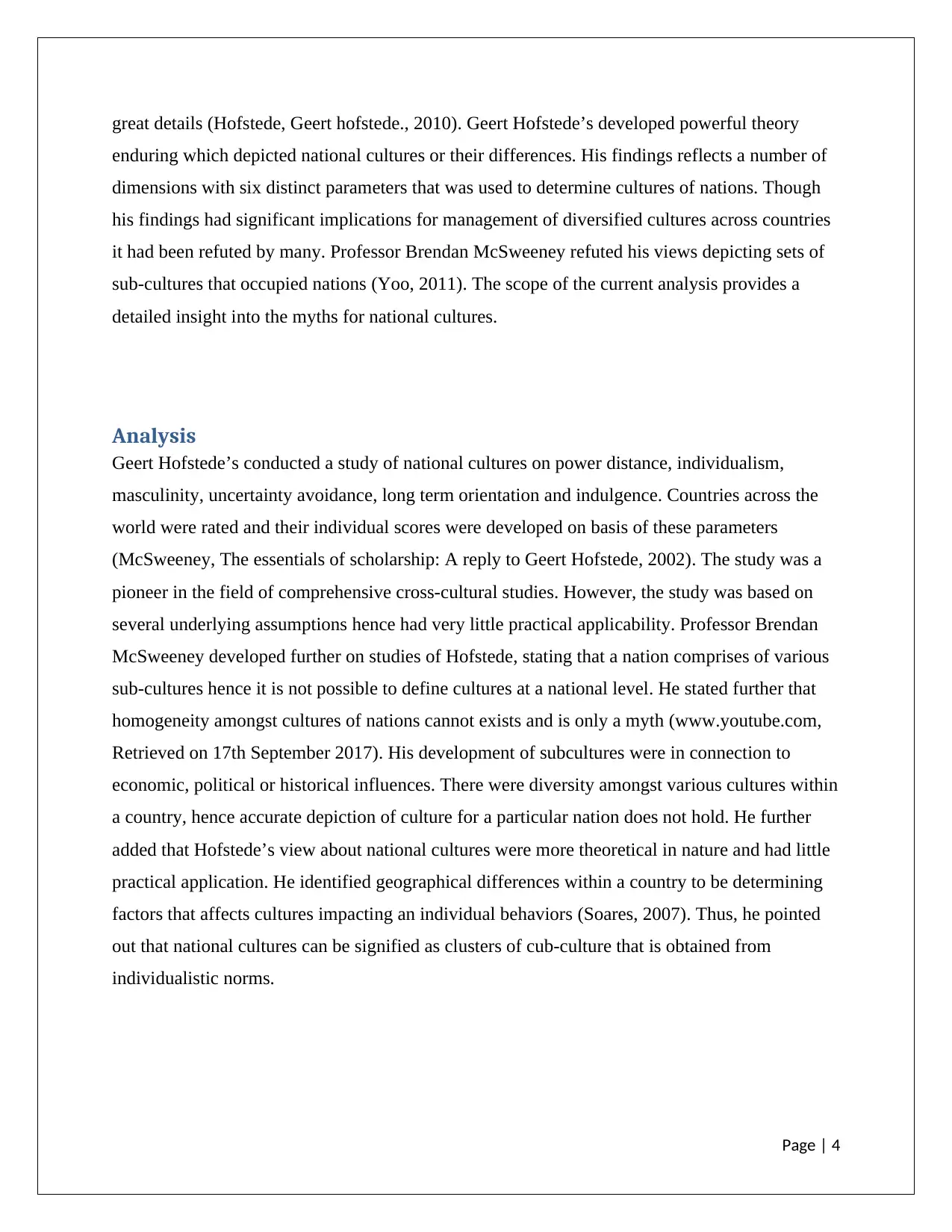
great details (Hofstede, Geert hofstede., 2010). Geert Hofstede’s developed powerful theory
enduring which depicted national cultures or their differences. His findings reflects a number of
dimensions with six distinct parameters that was used to determine cultures of nations. Though
his findings had significant implications for management of diversified cultures across countries
it had been refuted by many. Professor Brendan McSweeney refuted his views depicting sets of
sub-cultures that occupied nations (Yoo, 2011). The scope of the current analysis provides a
detailed insight into the myths for national cultures.
Analysis
Geert Hofstede’s conducted a study of national cultures on power distance, individualism,
masculinity, uncertainty avoidance, long term orientation and indulgence. Countries across the
world were rated and their individual scores were developed on basis of these parameters
(McSweeney, The essentials of scholarship: A reply to Geert Hofstede, 2002). The study was a
pioneer in the field of comprehensive cross-cultural studies. However, the study was based on
several underlying assumptions hence had very little practical applicability. Professor Brendan
McSweeney developed further on studies of Hofstede, stating that a nation comprises of various
sub-cultures hence it is not possible to define cultures at a national level. He stated further that
homogeneity amongst cultures of nations cannot exists and is only a myth (www.youtube.com,
Retrieved on 17th September 2017). His development of subcultures were in connection to
economic, political or historical influences. There were diversity amongst various cultures within
a country, hence accurate depiction of culture for a particular nation does not hold. He further
added that Hofstede’s view about national cultures were more theoretical in nature and had little
practical application. He identified geographical differences within a country to be determining
factors that affects cultures impacting an individual behaviors (Soares, 2007). Thus, he pointed
out that national cultures can be signified as clusters of cub-culture that is obtained from
individualistic norms.
Page | 4
enduring which depicted national cultures or their differences. His findings reflects a number of
dimensions with six distinct parameters that was used to determine cultures of nations. Though
his findings had significant implications for management of diversified cultures across countries
it had been refuted by many. Professor Brendan McSweeney refuted his views depicting sets of
sub-cultures that occupied nations (Yoo, 2011). The scope of the current analysis provides a
detailed insight into the myths for national cultures.
Analysis
Geert Hofstede’s conducted a study of national cultures on power distance, individualism,
masculinity, uncertainty avoidance, long term orientation and indulgence. Countries across the
world were rated and their individual scores were developed on basis of these parameters
(McSweeney, The essentials of scholarship: A reply to Geert Hofstede, 2002). The study was a
pioneer in the field of comprehensive cross-cultural studies. However, the study was based on
several underlying assumptions hence had very little practical applicability. Professor Brendan
McSweeney developed further on studies of Hofstede, stating that a nation comprises of various
sub-cultures hence it is not possible to define cultures at a national level. He stated further that
homogeneity amongst cultures of nations cannot exists and is only a myth (www.youtube.com,
Retrieved on 17th September 2017). His development of subcultures were in connection to
economic, political or historical influences. There were diversity amongst various cultures within
a country, hence accurate depiction of culture for a particular nation does not hold. He further
added that Hofstede’s view about national cultures were more theoretical in nature and had little
practical application. He identified geographical differences within a country to be determining
factors that affects cultures impacting an individual behaviors (Soares, 2007). Thus, he pointed
out that national cultures can be signified as clusters of cub-culture that is obtained from
individualistic norms.
Page | 4
Paraphrase This Document
Need a fresh take? Get an instant paraphrase of this document with our AI Paraphraser
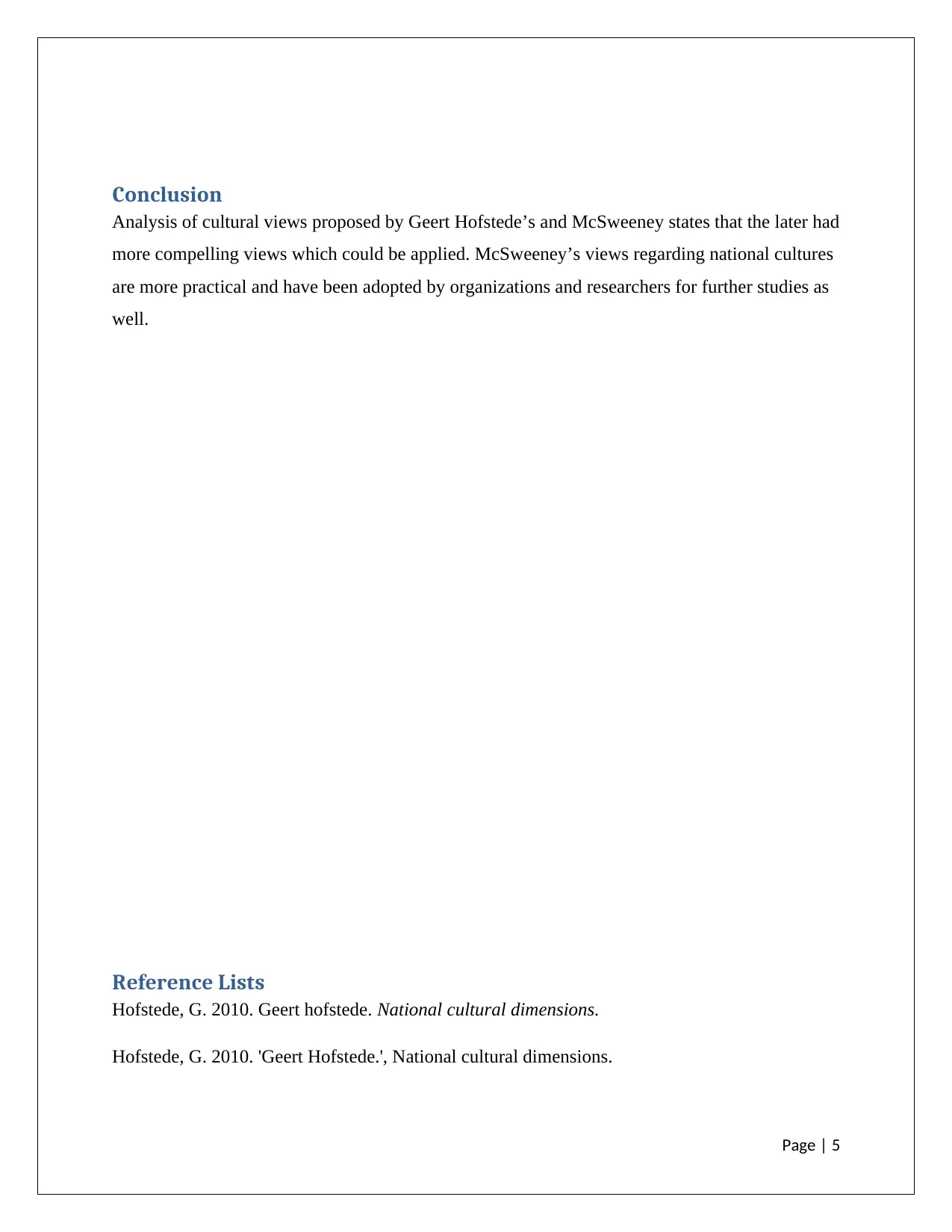
Conclusion
Analysis of cultural views proposed by Geert Hofstede’s and McSweeney states that the later had
more compelling views which could be applied. McSweeney’s views regarding national cultures
are more practical and have been adopted by organizations and researchers for further studies as
well.
Reference Lists
Hofstede, G. 2010. Geert hofstede. National cultural dimensions.
Hofstede, G. 2010. 'Geert Hofstede.', National cultural dimensions.
Page | 5
Analysis of cultural views proposed by Geert Hofstede’s and McSweeney states that the later had
more compelling views which could be applied. McSweeney’s views regarding national cultures
are more practical and have been adopted by organizations and researchers for further studies as
well.
Reference Lists
Hofstede, G. 2010. Geert hofstede. National cultural dimensions.
Hofstede, G. 2010. 'Geert Hofstede.', National cultural dimensions.
Page | 5
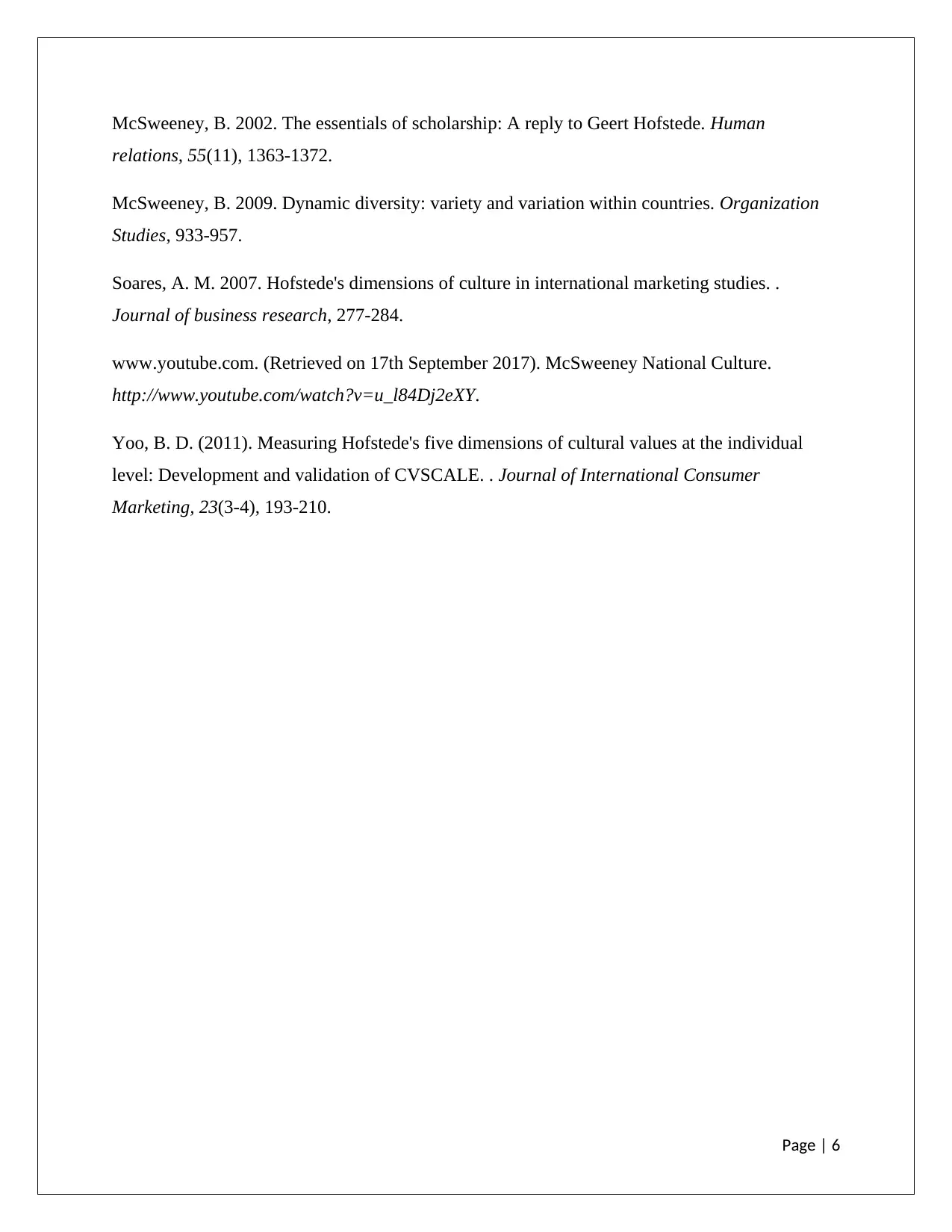
McSweeney, B. 2002. The essentials of scholarship: A reply to Geert Hofstede. Human
relations, 55(11), 1363-1372.
McSweeney, B. 2009. Dynamic diversity: variety and variation within countries. Organization
Studies, 933-957.
Soares, A. M. 2007. Hofstede's dimensions of culture in international marketing studies. .
Journal of business research, 277-284.
www.youtube.com. (Retrieved on 17th September 2017). McSweeney National Culture.
http://www.youtube.com/watch?v=u_l84Dj2eXY.
Yoo, B. D. (2011). Measuring Hofstede's five dimensions of cultural values at the individual
level: Development and validation of CVSCALE. . Journal of International Consumer
Marketing, 23(3-4), 193-210.
Page | 6
relations, 55(11), 1363-1372.
McSweeney, B. 2009. Dynamic diversity: variety and variation within countries. Organization
Studies, 933-957.
Soares, A. M. 2007. Hofstede's dimensions of culture in international marketing studies. .
Journal of business research, 277-284.
www.youtube.com. (Retrieved on 17th September 2017). McSweeney National Culture.
http://www.youtube.com/watch?v=u_l84Dj2eXY.
Yoo, B. D. (2011). Measuring Hofstede's five dimensions of cultural values at the individual
level: Development and validation of CVSCALE. . Journal of International Consumer
Marketing, 23(3-4), 193-210.
Page | 6
⊘ This is a preview!⊘
Do you want full access?
Subscribe today to unlock all pages.

Trusted by 1+ million students worldwide
1 out of 6
Related Documents
Your All-in-One AI-Powered Toolkit for Academic Success.
+13062052269
info@desklib.com
Available 24*7 on WhatsApp / Email
![[object Object]](/_next/static/media/star-bottom.7253800d.svg)
Unlock your academic potential
Copyright © 2020–2026 A2Z Services. All Rights Reserved. Developed and managed by ZUCOL.





